Jiang Li works as an Associate Professor of English at Shandong University, China since 2004. She completed her doctoral research at Berne University, Switzerland in March, 2014. The programs she was engaged in concentrated on language teaching. She is considering a change towards linguistic programs with more emphasis on research, probably still in China.
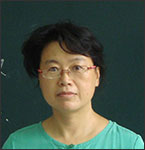
Jiang Li
Why did you choose return to China to work?
I have been working in China since 1994 and only stopped teaching intermittently for my doctoral research in Europe between 2009 and 2014. During the past 20 years, I have grown deeply attached to life in China, especially after I visited Europe. Compared with life of an expatriate family in Europe, here my child receives satisfying education and fully enjoys exploring the world with the company of friends with whom there is little barrier in communication. Our financial situation is good and it is getting better even if the salary is relatively low compared to developed countries.
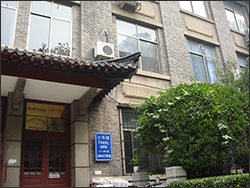
Shandong University Teaching Building
China is not paradise. However, we can foresee most of the difficulties and cope with life easily in the long run. It is the totality of things that keep me here. So my move after the doctoral degree won’t be a radical one. It simply involves changing to a program more concentrated on research rather than teaching.
How did you prepare for the move?
Initially I only needed to make small adjustments, I began to prepare for the change long ago. I’m not exaggerating when I say that the moment of change began even before I studied for a doctoral degree. It is hardly thinkable nowadays to do research at the Higher Education Sector without a PhD as even a small adjustment like the change of a program or institute requires a doctoral degree.
I selected some domestic universities and checked if they were enlisting researchers in my field, and in the meantime, I began to edit my Curriculum Vitae, write cover letters and collect reference letters.
What was it like immediately after you obtained your PhD?
For me, there was hardly anything new in the teaching environment, having been working here for 20 years and knowing every little improvement or simple changes in the university and the profession, but my students were very curious. They knew that I just returned from a doctoral examination in Europe and they wanted to learn about everything. So they asked all kinds of questions about my study abroad.
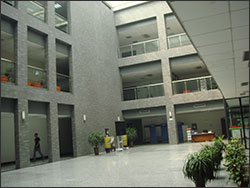
Shandong University Campus Building
I really hope young people in China take advantage of any travelling opportunities in a similar way to the students from developed countries in the west. Once they have seen more and learnt more, they will have more confidence to make future decisions about their work and life. They would not assume that life would be more advantageous in some developed countries.
What sort of work are you engaged in?
I studied English and got my B.A. and M.A. in English in China. That was more than twenty years ago. I have been teaching English as a second language to students at both undergraduate and graduate levels. We have many classes to teach, though it is said that there is a tendency to cut English classes as the reform in education goes on.
In China college English teaching undergoes ups and downs as an enterprise, just like a human being. We are facing a down stage, it seems. I personally welcome this change and I think I am ready for a stage when there is less teaching and more concentration on research and other improved ways of learning for the students.
How many hours do you work?
As an English teacher for non-English majors, it is stipulated that an instructor teaches no less than 12 hours a week. This is only an average though,newly qualified teachers are almost always asked to teach more classes than this. It is amazing that our university offers so many classes for students, given that our department has nearly 200 teaching staff. Last semester I taught 12 hours a week.
How did you find the Higher Education sector in China?
I’m happy to say that it is getting better and better to work in the Higher Education sector in China after all these years. My salary has improved significantly as academic careers have progressed during the 20 years since I began.. There are more and more mature opportunities for people with academic ambition to do what they want nowadays.
For the same reason, the Higher Education sector also becomes highly competitive in China. A doctoral degree is indispensable for applicants who would like to pursue an academic career. Major universities not only require doctoral degrees but also bachelor and master degrees from domestic 985 and 211 institutes, those sanctioned as the best ones by major national projects.
How does Chinese university teaching differ from the European univerisities?
One may argue that there is little difference as teaching essentially means imparting learning and methods of learning, whether in the west or in the east, but teaching, whilst based on myriads of details, also involves much attention to detail and details can be vitally different in China. Modern Chinese universities began the focus on education and research fairly recently in comparison globally, and progression can still face some structural challenges.
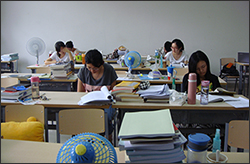
Shandong University Classroom
Current Chinese students tend to focus too intently on short-term tasks and need more guidance in creating a long-term plan, after entering college or university. They say they are pressured to do so and have to spend more energy out of study to secure a better . A common element for teachers at universities and colleges is that a semester’s work is usually guided by syllabus, or goals and objectives of the program. Therefore it is always helpful to be carefully organised and focussed here in China. A new teacher, before they can become established, acknowledged and acclaimed in his or her personal style, can only start to explore his or her freedom of organising details of a semester’s teaching within the dimensions of limited time (one or two terms, for example) and the scope of the subject taught.
There is also little difference when it comes to research. The more experience you have conducting research, the easier it will become for you to find the right way and the more productive you will become in your field. It is always advisable to get a solid research foundation as early as possible in your career.
What about your work with the students?
It is most rewarding as a teacher, to witness your students growing in confidence before your eyes. There are few cultural obstacles between my students and myself, which helps me to understand and meet their needs in study, which – in turn – aids with implementing our teaching program.
In a teaching program, I tend to assume the secondary role of a helper in and out of class, but I also supervise and control the quality of my students’ work to optimise the overall result of the program. The students have plenty of autonomy to be themselves in the process of study and they enjoy it.
Depending on the fields of study, some teaching programmes may become popular among the students by making the teaching material more entertaining and original.
Generally speaking, students with positive attitudes towards learning can always gain a lot from the teacher and other respects of the program alike. I am happy and grateful about my teaching experience with my students.
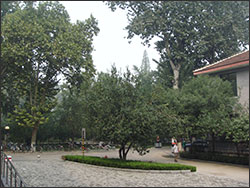
Shandong University Campus Grounds
What is the social life like?
I practice Taiji boxing and learn from respectable senior citizens in our community on a daily basis. We meet regularly in a public garden. Thus I have relatively little spare time to develop other hobbies with friends after teaching, looking after the house and family and practising Taiji. But once in a month, I would eat out with friends in some favourite restaurants and talk. On weekends we would drive to the suburbs and relax ourselves with family and relatives.
My city Jinan is one of those second-tier cities where history is abundant, landscape is varied, life is relaxed and people are friendly. It is not difficult to find international sectors in universities and colleges where both overseas students and teachers live so that they can communicate easily and learn about all kinds of ongoing activities. It is not difficult for people to host parties to socialise with their peers as there are lots of resources and support socially available.
Unlike Europe, we hardly have bank holidays for the commercial sector and one can go visit big supermarkets as late as 10 o’clock in the evening and open markets which last until small hours of the morning.
What have you enjoyed most about your time in China?
China is a big country and it has a lot to offer in terms of landscape, people and culture. Compared to countries in Europe, one can expect high variety in sightseeing, food and lifestyle. There is also great opportunity to explore history, heritage and culture.. Personally, I enjoy some deep-rooted traditional hobbies such as Taiji boxing and Peking Opera but I hear many different experiences from visitors. Some people enjoyed travelling and others enjoyed the local cuisine, whilst the more adventurous took advantage of the more challenging outdoor pursuits available in the surrounding mountain regions or coastal areas.
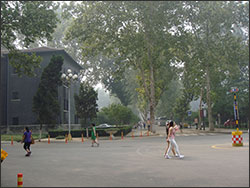
Shandong University Campus Grounds
Do you face any particular challenges?
Not really after some twenty years in the same profession, but for people who are new to China, they might face a lot of challenges if they speak little Chinese and may struggle with the language barrier if they assume that this is a country and culture similar to a European one. One has to adjust to a seemingly unfriendly but in fact really quite helpful culture. Teaching and research would pose relatively little difficulty if they are founded well enough in their field before joining the Higher Education sector in China.
How has studying overseas helped your career?
I cherish my culture and my people a lot more after visiting and studying overseas. I am more confident and relaxed. I could visualise how we should improve ourselves and stopped complaining about my environments. I also learnt a great deal from European colleagues and I am trying to implement more of what I have learnt in Europe to my teaching and research here in China.
What was the best moment?
A moment like now. I feel very relieved now because I have made the big decision about my career. Several years ago when I first started to do my doctoral research, I was not certain where I should go after completion. Now I have made up my mind to stay and do my research in China, I am really happy. Looking back, I always relish those moments when I found that I could concentrate more easily on my work and life without being dragged and afflicted by too many seemingly good possibilities.
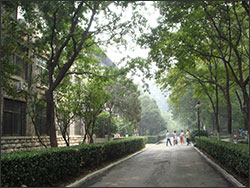
Shandong University Campus Students
Have you got any advice for other academics planning to work in China?
China is definitely a good choice so don’t hesitate if opportunities arise and the location is the only reason to keep one from going. If you make the move, you can always look for new opportunities once you have settled should you find yourself unhappy with your initial choice. Job mobility is becoming easier in modern academia. . According to an expatriate who lives and works here, ‘China’s been a completely wonderful experience.’ ( See http://www.expat.hsbc.com/1/2/hsbc-expat/expat-experience/expat-destinations/china-why-expats-are-heading-east for more details.). Learn some of the language and about the culture before you move as this will be very useful.




Please I’m a Ghanaian and have obtained both Bachelor’s degree and a Masters degree in English Language. I obtained them at the university of Cape Coast in Ghana. I would like to inquire from your office if there is any scholarship opportunity that will enable me pursue a PhD in English language in Shandong University this year?
Please I am Muhammad Farooq and have obtained my M.phil in English literature degree from the university of Pakistan and want to obtain degree of phd in English from china Kindly guide me in this regard.